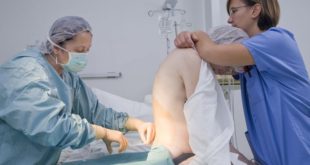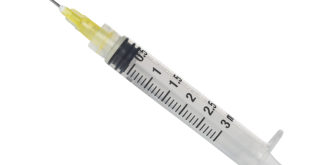Worried about having chest pain and undergoing anesthesia? Read one of the site’s best question and answer series below.
Hi Dave,
I am going in for a shoulder operation in 7 days time, I’m 38, I am not overweight and fairly fit and I exercise regularly for the past 4 years. Sometimes I get a slight pain in my chest around the lower pectoral, just above the top of my ribcage, there’s no radiation of pain to my left arm, neck or jaw and it does not happen during cardio. Just at random times, sometimes when I’m sitting or standing, and then it goes away. I went to get checked out at hospital about 12 months ago and they did all the tests and were pretty sure it wasn’t heart related and could be some kind of muscular costio condroititis. Im quite fit but I did used to smoke.
My question is could this pose a risk to going under anesthetic if there was perhaps a problem with my heart?
Thanks
Nick
-
DrJoe says:
Nick,
Thanks so much for posing your question to us! First of all, let me congratulate you on your attention to your health.
But on to your question and for the good news. The description of your chest pain is not typical of heart related pain. In addition, the fact that you had normal test results 12 months ago is also reassuring and makes a cardiac cause less likely. But that does not mean that your chest pain should be ignored or that it is unimportant.
There are many causes of chest pain, one of which is coronary artery disease. As you know, there are many known risk factors for coronary artery disease. The ones that are potentially controllable are obesity, high cholesterol, diabetes, stress, smoking, high blood pressure, lack of physical activity, and an unhealthy diet. Other risk factors that are uncontrollable are gender, age, and family history of coronary artery disease.
In answer to your question, if there was a problem with your heart, it could pose an increased risk to undergoing a general anesthetic. From your story though, it seems less likely that your pain is related to your heart. If your operation is in 7 days, I would recommend calling your primary physician (or establishing a relationship with one) and getting an appointment this week. This physician can review your symptoms, risk factors, medical history, blood work, and EKG. If anything, this can give you further reassurance that your heart is healthy for the operation and that you are not at increased risk for complications from anesthesia. Of course, if anything is concerning, your primary physician may choose to order further testing.
I hope everything turns out well for you. Please keep us updated and let us know what your anesthesia experience was like.
Stay healthy,
Dr. Joe-
Nick says:
Ok Joe thanks so much for your reply, can I ask you one more question on that. If it were some kind of coronary artery disease, what would be the normal coarse of action to combat this?( My diet could be healthier I must say) And yes I will let you know how I go next Tuesday…Ive never had an operation before so this is why I’m a bit spooked by it all

Nick
-
DrJoe says:
Nick,
I would recommend visiting with a primary care physician if you haven’t done so already. Ask around at work or among your friends to see if they have a physician that they trust. And because you are motivated to improve your health, this physician will guide you to a healthier life.
There are modifiable risk factors for coronary artery disease and your physician will help you with this. For instance, if your blood pressure is elevated or your cholesterol is abnormal, perhaps medicine is appropriate (in addition to a healthy diet and regular exercise).
But family history of coronary artery disease does play a role and you can’t change this. My dad had a severe heart attack at 52 despite regular exercise, no smoking history, and normal blood pressure. Heart disease just runs in my family’s genes.
If this is the case for you, I would recommend establishing a primary care physician even more. They are the experts at knowing which therapies to use, what types of tests are in order, and when a specialist needs to be seen (I am preaching to myself here too).
Plus, you may receive reassurance that you are doing the right things to keep your heart healthy.
By the way, what type of shoulder surgery are you having? Let us know how it goes.
Dr Joe
-
Nick says:
Ok Joe I will take on board what you have just told me…thank you again pointing out that information. The type of surgery I’m having is my subscapularis tendon has torn and needs to be reattached to the bone, also the long head bicep tendon is subluxed, so I’m having tenodesis done on that. Im not sure of the success rate at these operations, but I’m hoping for the best.
If you can shed some light or give me some tips on this that would be great too
Thanks heaps Dr Joe
-
DrJoe says:
Nick,
Thanks for letting me know the type of surgery you are having. Sometimes for shoulder surgery, a “nerve block” is performed by the anesthesiologist. This involves placing numbing medicine near your shoulder to anesthetize the nerves that provide sensation to your shoulder. And this is usually done in addition to general anesthesia.
The numbing medicine can last for 24 hours or more and can significantly decrease the amount of post operative pain. In some instances, a tiny catheter is placed under the skin of your shoulder to continuously supply numbing medicine to the area. This is called a continuous nerve block.
Your orthopedic surgeon will be the one to decide whether a nerve block would be beneficial for you. If so, the anesthesiologist will discuss the risks and benefits with you. I just wanted to make you aware that a nerve block may be offered to you on Tuesday.
Let us know how it goes on Tuesday!
-
-
-
 Anesthesia Myths: Get the Facts, Lose the Fear | Your #1 Anesthesia Resource in Simple language
Anesthesia Myths: Get the Facts, Lose the Fear | Your #1 Anesthesia Resource in Simple language




